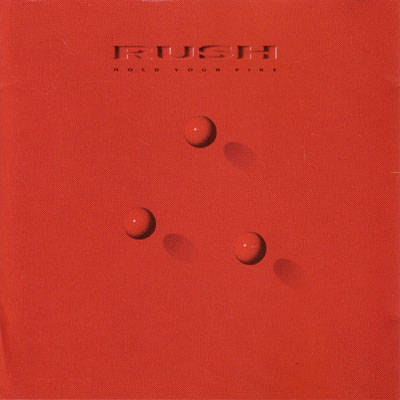
Hold Your Fire (1987)

1.Force Ten
2.Time Stand Still
3.Open Secrets
4.Second Nature
5.Prime Mover
6.Lock and Key
7.Mission
8.Turn the Page
9.Tai Shan
10.High Water
With Hold Your Fire, it’s as though Rush decided the safest move was to not move at all — at least not too far. After the critical and commercial success of Power Windows, and the continued adulation from their loyal live audiences, the band made the rather sensible choice to stick with what worked. Geddy Lee dusted off the same arsenal of synths and digital flourishes, Peter Collins returned to the producer’s chair, and together they attempted to craft what was effectively a sequel.
In some ways, they succeeded. There are moments here that dazzle. The opening track, Force Ten, might be one of the most thrilling album openers the band ever laid to tape — a fusion of muscular rhythm and sonic wizardry that declares, quite defiantly, that Rush weren’t finished with their love affair with electronics just yet. But for all the moments that shine, it’s hard to escape the impression that Hold Your Fire lacks the consistent firepower of its predecessor.
One of the immediate differences — and one that may go unnoticed today — is the sheer length. Ten tracks. A non-issue now, but in 1987, with vinyl still the dominant format in many corners, this was stretching the structural norms of an “album.” The advent of compact discs meant more space, yes — but space doesn’t always equate to substance. The old adage “less is more” often applies, and rarely more so than here.
The most glaring misstep is Tai Shan — a track so unlike anything else in the Rush canon that even the band has since admitted some level of buyer’s remorse. Inspired by Neil Peart’s travels in China, and laced with what one might generously call “Eastern motifs,” it sounds less like a rock track and more like a background cue for a travel documentary. Ambitious? Certainly. But in this case, ambition overwhelms execution.
Elsewhere, there are signs of the band trying a little too hard to recapture old glories. High Water, with its global musings and tribal pulse, feels like an attempt to bottle the essence of Territories once more. It’s not bad — in fact, it has some lovely moments — but it never quite reaches the same thematic or musical heights. The same might be said of Open Secrets, which bears more than a passing resemblance to Middletown Dreams from the previous album. Thoughtful, yes, but overly familiar.
Yet to write off Hold Your Fire would be a mistake. Alongside Force Ten, several other tracks elevate the collection well above mere footnote status. Time Stand Still, the first single, brought in Aimee Mann from 'Til Tuesday for a curious vocal cameo. The addition is subtle, even puzzling at first, but ultimately charming — a soft counterpoint to Lee’s usual high-register delivery. It’s a polished, atmospheric piece and remains one of the better songs from this era.
Mission and Prime Mover are also strong contenders for standout status, each marrying lyrical introspection with slick, propulsive arrangements. Meanwhile, Second Nature and Lock and Key won’t make anyone’s all-time top five, but they’re more than serviceable — the kind of solid, mid-table entries that round out a record without derailing it.
Perhaps the most revealing truth about Hold Your Fire is that, in hindsight, it marks the final chapter of Rush’s keyboard-dominated period. No one knew it then — maybe not even the band — but this was the last full embrace of digital excess before the pendulum began to swing back toward guitars, grit, and a leaner aesthetic.
So, no, Hold Your Fire isn’t Power Windows II. It tries to be, and in some places, it comes remarkably close. But it’s also a little too long, a little too polished, and just a little too cautious. A good record, but not a great one. Still, even when merely good, Rush remained streets ahead of most of their contemporaries — and for fans, that was more than enough.
Go back to the main page
Go To Next Review